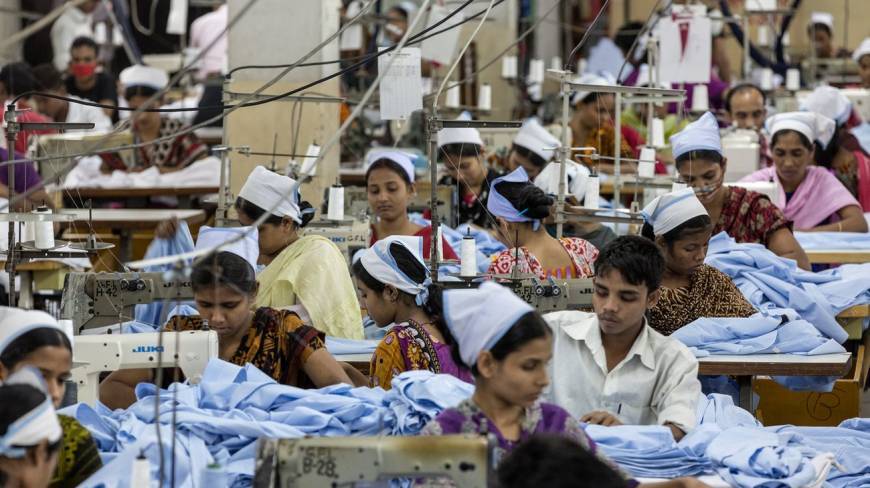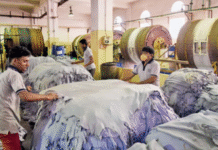When Rubina Yeasmin was 13, her father died of a heart attack. Her mother scraped together the money to keep her in school but finances became increasingly tight. “My uncle said I must leave school and get married.”
She grew up in Topshe village in Dinajpur district, in northern Bangladesh. According to a Unicef report (pdf) published last year, 65% of girls in Bangladesh are married before the age of 18, and 29% before they are 15. For poor families, early marriage can ease financial pressure as it means one less mouth to feed. It can also negate the need for girls to be educated.
Yeasmin refused to marry and fought to be allowed to complete her education. Her family gave in and she stayed at school. On graduating, she moved to Dhaka, the capital, to work as a quality control inspector in one of the city’s many garment factories.
Her employer, the Ananta Group, makes clothes for H&M, Gap and Next. Yeasmin worked overtime, boosting her earnings to about 10,000 taka (£91) a month and sending money home so her younger brother, Murad, could go to school too.
She could not imagine her situation improving, until she was called to a meeting at the factory and learned of a scheme – the first of its kind – launched by the Asian University for Women (AUW) to provide free university education to women working in Bangladesh’s garment factories.
“I jumped to my feet,” she says. “I was the first one to stand up and say, ‘I will apply.’”
The AUW opened in 2008 in Chittagong to educate the brightest young women with the greatest potential, and create a new generation of female leaders. The AUW is a regional university, attracting students from 15 countries in Asia and the Middle East.
It is funded by donors including the Ikea Foundation and the Bill and Melinda Gates Foundation. Its founder, Bangladeshi-American Kamal Ahmad, says that, unlike most Asian universities, which admit only those able to pay fees, “our cardinal principle is to recruit the most talented people, irrespective of background.”
Sonia Akter is in her fourth year at the AUW. She grew up in the village of Mushuria, Tangail district, “where no girl had ever attended university before,” she says.
She took advantage of an earlier initiative to recruit poorer students to the AUW via the Grameen Bank, Bangladesh’s Nobel prize-winning microfinance institution.
An exceptionally bright student, according to her teachers, she has completed internships in Cambodia and India. During the latter spell she worked on a project with Kiran Bedi, India’s first female police officer, to encourage women to start businesses. Last summer, she won a scholarship to attend the Lucerne Academy for Human Rights Implementation in Switzerland.
“When I left my village, members of the community criticised my mother for allowing me to go, but their attitudes are changing because they have seen what I’ve achieved,” she says. “To visit home, I have to walk from the bus station to the village. It used to take 30 minutes. Now it takes at least two hours because so many people come to talk to me. The same people who used to believe that educating girls was pointless are starting to want the same for their daughters. If I can make female education popular in my village, then I can do it for the whole of Bangladesh.”
The garment factory workers’ university fees are covered by charitable donations, but the AUW requires factory owners to continue to pay wages while the women study. Their families rely on the income and would not let them attend otherwise. Mowmita Basak, one of the AUW’s first graduates, was given the task of convincing factory owners to agree to these terms and send their employees. She recently returned to her native Bangladesh, having completed a master’s degree at the UK’s University of Bradford.
“I didn’t get a very positive response at first,” says Basak. But her impassioned argument that this was a golden opportunity for them to support their workforce and improve their reputation, countering the storm of negative publicity triggered by the collapse of Rana Plaza in 2013, and the widespread perception of garment factories as sweatshops, won out. Five owners signed up.
“Next, I visited factories and gave presentations to the workers,” says Basak. “Only girls who had completed high school were eligible to apply, and the selection process was competitive.” Candidates took exams in mathematics, Bengali and English, and those who passed were interviewed.
Of 653 applicants, 22 were offered a place in the first intake this year. Yeasmin was one of them. In January, she started a two-year preparatory course before embarking on the university’s liberal arts curriculum. “I never imagined this could happen to someone like me,” she says. “It’s like a dream come true.”
Source: Dhaka Tribune










